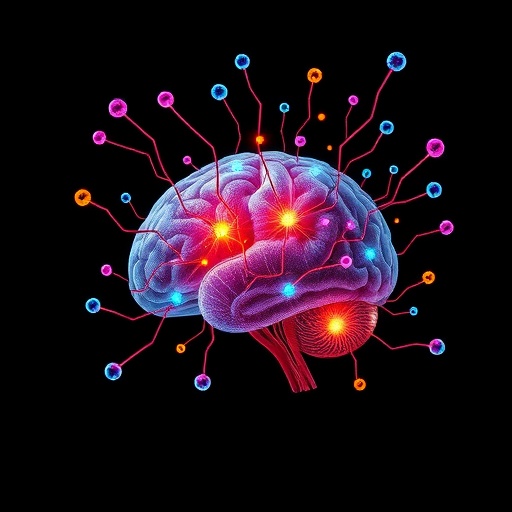In a groundbreaking study published in BMC Psychology, researchers Bayraktar and Battal delve into the intricate relationships between emotional intelligence, stress management capabilities, and the associated hormonal and cerebral responses among university students. This pioneering research sheds new light on how psychological competencies intertwine with physiological reactions, offering promising avenues for enhancing student well-being in academically demanding environments.
Emotional intelligence (EI) has long been heralded as a cornerstone of effective interpersonal functioning and mental health resilience. However, its underlying neurobiological correlates and interaction with stress hormones remain inadequately understood. Bayraktar and Battal’s investigation provides a comprehensive exploration into how EI levels are not just abstract psychological constructs but are closely mirrored in hormonal fluctuations and cerebral activity patterns under stress.
The study cohort comprised a diverse group of university students undergoing various assessments aimed at quantifying their emotional intelligence and stress-management skills. The researchers employed a battery of psychometric tools designed to measure components of EI, such as emotional awareness, regulation, and social skills. Coupled with these tools, advanced hormonal assays and neuroimaging techniques captured real-time physiological and brain responses, offering an unprecedented multi-dimensional understanding of the interplay between mind and body.
Central to the study’s experimental design were the hormonal biomarkers cortisol and oxytocin, hormones closely linked to stress response and social bonding respectively. Cortisol, often dubbed the “stress hormone,” surges during periods of acute or chronic stress, potentially impairing cognitive functions. Conversely, oxytocin is associated with social affiliation and may counteract stress effects. By analyzing these hormonal changes under controlled stress-inducing conditions, the research identifies how individuals with varying emotional intelligence levels differ in biochemical resilience.
Neuroimaging findings further elucidate the cerebral underpinnings of these processes. Participants with higher emotional intelligence exhibited enhanced activation in prefrontal cortical regions involved in executive function and emotional regulation. These brain areas orchestrate complex cognitive tasks including impulse control, planning, and moderating social behavior. The ability to recruit these neural circuits effectively may explain how individuals with elevated EI manage stress more adaptively.
This research also highlights the amygdala’s role, a brain structure critical for processing emotional reactions and fear responses. Those with lower EI displayed heightened amygdala activation, which correlated with elevated cortisol levels and diminished stress management capacity. These observations align with the hypothesis that emotional intelligence facilitates a buffering effect against the deleterious impacts of stress by modulating amygdala activity.
The implications of these findings reverberate strongly in educational contexts where stress can impair academic achievement and mental health. By fostering emotional intelligence in students, universities could implement targeted interventions to improve not only psychological well-being but also physiological stress resilience. Techniques such as mindfulness training, emotional skills workshops, and cognitive-behavioral strategies emerge as promising tools to modulate underlying neurohormonal systems.
Moreover, the study breaks new ground by integrating hormonal assays and neuroimaging data, enabling a holistic perspective seldom achieved in psychological research. This multi-modal approach underscores the complexity of the stress-emotion nexus, demonstrating that emotional intelligence operates through both hormonal pathways and brain networks to determine individual stress responses.
In a society increasingly aware of mental health challenges, especially among young adults navigating academic pressures, this research provides a scientific foundation for developing personalized strategies to enhance coping mechanisms. The biological evidence linking emotional intelligence to stress regulation offers compelling rationale for early emotional training that could mitigate risks for anxiety, depression, and burnout.
Bayraktar and Battal’s work also opens avenues for further investigation into the bidirectional influence between hormonal states and emotional competencies. For instance, future studies might explore how interventions that elevate oxytocin or reduce cortisol biologically mediate improvements in emotional intelligence, thereby establishing causality and potential therapeutic pathways.
Intriguingly, the study goes beyond the simplistic view of stress as purely harmful by illustrating how moderate stress responses may be adaptively harnessed as motivational forces when coupled with high emotional intelligence. This nuanced understanding advocates for more sophisticated frameworks in stress research, encompassing both vulnerability and resilience mechanisms within the brain-body axis.
The researchers caution that while their findings are robust, the cross-sectional design limits assertions of causality, and longitudinal studies will be critical to unravel the temporal dynamics between emotional intelligence development and physiological stress adaptation. Additionally, expanding sample diversity across cultural and socio-economic backgrounds will enhance generalizability.
With rising mental health concerns on campuses worldwide, this seminal study provides vital data supporting the inclusion of emotional intelligence curricula in higher education. It compels policymakers, educators, and mental health professionals to consider integrated modalities that blend psychological skill-building with neurobiological awareness to promote holistic student wellness.
In essence, the intricate dance between hormonal signals and cerebral circuits orchestrated by emotional intelligence underscores human adaptability’s sophisticated nature. This study illuminates pathways through which young adults can cultivate resilience, transforming stress from a debilitating burden into an opportunity for growth and emotional mastery.
By bridging psychology, endocrinology, and neuroscience, Bayraktar and Battal set a new standard for interdisciplinary research in mental health, charting a roadmap for future inquiries into how individual differences in emotional faculties shape physiological stress responses and overall human performance.
As universities grapple with escalating student stress and mental health crises, there is now compelling scientific evidence advocating for emotional intelligence enhancement as a foundational strategy. This research heralds a paradigm shift from reactive treatment to proactive empowerment rooted in biological and psychological synergy.
Subject of Research: The relationship between emotional intelligence levels, stress management skills, and hormonal and cerebral responses in university students.
Article Title: The relationship between emotional intelligence levels, stress management skills and hormonal and cerebral responses in university students.
Article References:
Bayraktar, B., Battal, F. The relationship between emotional intelligence levels, stress management skills and hormonal and cerebral responses in university students. BMC Psychol 13, 1231 (2025). https://doi.org/10.1186/s40359-025-02951-2
Image Credits: AI Generated




